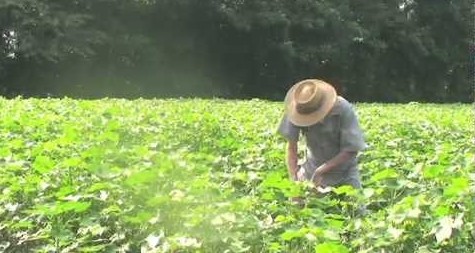We often hear about the healthy vitamins and nutrients that we get from eating certain vegetables, fruits, nuts, and grains and how essential they are to good health, but where do all of those healthy nutrients actually come from? It is a very basic fact of agriculture and plant biology that a plant is only as good as the soil in which it is planted. Nutrient rich soil produces nutrient rich plants, where as soil which is depleted of nutrients will produce less nutrient rich plants. Likewise, soil that is unhealthy and contaminated with toxins will, in turn, produce plants that are also unhealthy and contaminated with toxins. Given these basic facts, it should come as little surprise that if we want to produce healthier, more sustainable food, we need to have healthy and sustainable soil in which to grow that food. This is why the state of American soil is of such a disturbing problem.
The American approach to food is at its core a system of ill health and unsustainable production from the ground to the table. The generally accepted approach to mainstream agriculture in the US has been based on a model of immediate profit at any cost. This means that not only is it unsustainable for the future economics of the industry, but it also results in sacrificing the quality of what is being produced, the ability for long term production, and environmental integrity. This approach results in soil that is depleted of nutrients, which of course, results in crops that are no longer as nutritional as they need to be. To better understand this, a study by Mississippi State University took a look at whether or not the growth and size of antlers on local deers were affected by the quality of the soil in their area. They compared thee different regions in the state and what they found was that the areas in which the soil was richer and more fertile, the deers were found to have stronger, larger antlers than their counterparts in areas where the soil was more depleted. How then, can we grow strong healthy bodies, without strong healthy soil?
This should paint a very vivid picture for us and make us question how our health is then impacted by poor soil quality. Also, this should remind us that this does not affect only crops, but the meat that the nation consumes as well because any animal, human or otherwise, can only be as healthy as the food it consumes. Large scale, factory farms over-taxing the land, planting singular crops, the use of toxic chemicals for pesticides and other uses, and the use of GMO’s (Genetically Modified Organisms) have all lead to a destruction of the soil. Some farming practices that have attempted to artificially fix the problem have actually made it worse by creating a situation of nutrient pollution. Applying fertilizers in an attempt to artificially insert nutrients into depleted soil does not actually work, for a variety of reasons. The imbalance it creates as it sits on top of the soil produces waste that gets carried off in erosion and can end up contaminating ground water, rivers, and creates havoc in the ocean and bays around the world. Nitrogen and Phosphorus are the two most common such pollutants which are posing serious environmental risks and are contributing to dead zones in the ocean where the majority of the planet’s oxygen supply comes from.
A further problem with soil erosion and nutrient depletion is that, left un-checked, it will begin to create dead zones on land as well where the soil is no longer able to produce. This means trouble for farmers, for the economy and eventually a drop in food production which could result in hunger and famine across the nation.
So what is the solution? Crop rotation and Permaculture are both important tools in fixing our soil problem. Companion planting, organic and natural farming, cover crops, no-till approaches, and allowing the land to rest in periods as a part of a rotating farming system are all simple yet extremely affective ways of fixing the problem and insuring that not only is food safe and healthy, but that the land will be able to produce for future generations to come, as Franklin D. Roosevelt once said, “A nation that destroys its soil destroys itself.”















